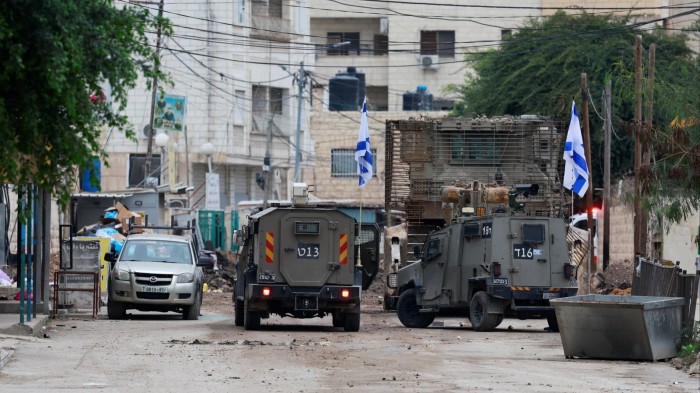Unlock the Editor’s Digest for free
Roula Khalaf, Editor of the FT, selects her favourite stories in this weekly newsletter.
Israeli forces pressed on with a big military operation in the city of Jenin in the occupied West Bank on Wednesday, as Israel’s defence minister said the government was changing its “security concept” in the Palestinian territory.
The raid, which began two days after a fragile ceasefire between Israel and Hamas took effect in Gaza, is the latest in a series of deadly Israeli operations in Jenin and its refugee camp, which has become one of the main militant strongholds in the West Bank.
The Palestinian health ministry said that 10 people had been killed in the initial stages of the raid in Jenin on Tuesday, and a further 40 had been injured.
Israel’s military said on Wednesday that it had “hit” 10 militants and that the operation was continuing, but declined to say how long it would last.
Israel Katz, the country’s defence minister, said the raid in Jenin marked a “change in the Israeli military’s security concept” in the West Bank, and that Israel would “learn the lesson” of previously having carried out repeated raids in Gaza.
“[This is] a powerful operation to eliminate terrorists and terrorist infrastructures in the camp — without the recurrence of terrorism into the camp upon the end of the operation,” he said.
However, the Palestinian foreign ministry condemned the raid as part of an effort by Israel’s government, widely regarded as the most rightwing in the country’s history, to “consolidate” its half-century long occupation of the West Bank, and “gradually annex” the territory, which Palestinians see as the heart of a future state.
The operation in Jenin follows repeated demands by far-right ministers in Benjamin Netanyahu’s government for a more aggressive approach in the territory, where Israeli forces have killed more than 800 people since the start of the war between Israel and Hamas in Gaza last year, according to UN data. Over the same period, Palestinians in the West Bank have killed 29 Israelis.
A person familiar with the situation told the Financial Times that the Israeli war cabinet had agreed to update its war goals to include security in the West Bank, in order to stop Bezalel Smotrich, a far-right settler who heads one of the four parties in Netanyahu’s coalition, from leaving the government over its decision to approve the ceasefire with Hamas in Gaza.
The raid was accompanied by the arrests of more than 25 people in Bethlehem, Hebron, Ramallah and Tulkarem, according to the Palestinian news agency Wafa.
Residents told the FT that Israeli forces had also set up new checkpoints in multiple locations across the West Bank.
Israel launched the operation in Jenin on Tuesday, a day after US President Donald Trump said he would lift sanctions imposed by his predecessor Joe Biden on extremist Jewish settlers who have carried out a string of attacks on Palestinians in the West Bank.
Settlers carried out further attacks on Tuesday, with dozens rampaging through the town of al-Funduq, torching cars and buildings.
Jordan’s foreign minister Ayman Safadi said that his country was deeply concerned about the situation in the West Bank, warning that events there could “destabilise” the entire region.
“Maintaining the security of the West Bank, making sure that the West Bank does not explode, is something of a top priority, and it is dangerous what’s happening there,” he said at an event in Davos.
“I think the whole world needs to take a deep look at what’s happening,” he said, arguing that people should be working with as much vigour as they applied to the Gaza ceasefire “to prevent an explosion [in the West Bank]”.
This article was originally published by a www.ft.com . Read the Original article here. .

